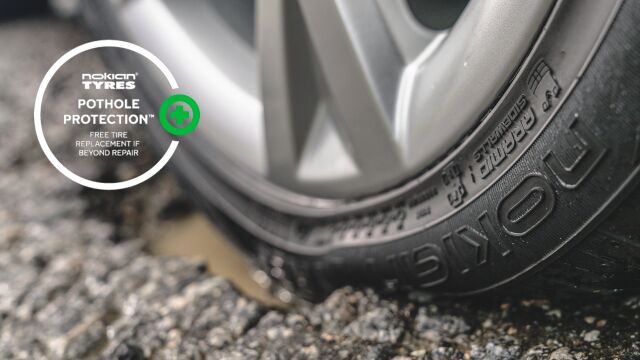Thu March 4 08:50 am 2021 in category Company news
Nokian Tyres Educates Drivers About Aramid Technology, Pothole Protection

The company equips the latest generation of most of its tires with puncture-resistant Aramid fibers
DAYTON, Tenn. – As roads freeze and thaw in the late winter weeks, potholes present a growing risk to drivers. That’s why Nokian Tyres is educating consumers about the technology it employs to help protect its tires from potholes and other road hazards – puncture-resistant Aramid technology.
This week, the company released a social media video with Nokian Tyres Director of Products Steve Bourassa about how the sturdy fiber helps keep drivers safe. Accompanying the video on the company’s social media feed are an infographic and blog post about Aramid technology.
“Potholes and road hazards cause major inconvenience for drivers,” said Bourassa. “Anything we can do to help prevent those are certainly a benefit to the consumer. One of the great ways we’ve found is by using Aramid fibers in the tires.”
Found in bulletproof vests and used in the aerospace and defense industries, Aramid is a puncture-resistant material Nokian Tyres uses to reinforce the sidewalls of many of its products. The lightweight, chemically neutral compound has been found to decrease the likelihood of punctures due to road hazards.
“Aramid provides mechanical strength to the tires,” Bourassa said. “By meshing together with the rubber, it kind of acts like fiberglass would. It’s a lightweight material that adds mechanical strength and helps prevent damage that would cut your sidewalls or create road hazard bubbles you sometimes see on your tires.”
Nokian Tyres first added Aramid to its SUV tires with the introduction of the Nokian Hakkapeliitta 8 SUV winter tire in 2014. Since then, the company has incorporated it throughout its product portfolio, most recently in the Nokian Tyres One and Nokian Tyres One HT, its newest North American all-season tires. In fact, some versions of the Nokian Tyres One HT are even equipped with Aramid Tough Armor beneath the tread, too.
Unlike other pothole protection solutions, Aramid comes with very few downsides.
"One way a tire manufacturer can reinforce a tire is by adding more rubber to the sidewall that would make it stronger, but that would create a heavier tire and change the dynamics of the tire and the handling properties," said Bourassa. "By making the tire heavier, it would also detract from the rolling resistance. Nokian Tyres is developing ways of reinforcing the tires without adding significant weight. Aramid fibers are a great way to do that."
Aramid represents a flexible solution that tends to be compatible with other substances found in tires.
“One of the things that’s interesting in my mind is that Aramid, from a chemical perspective, is quite neutral,” Bourassa said. “Sometimes when you add elements to a tire, it will affect other chemicals in the compound. It’s nice that Aramid doesn’t really have an impact on those other chemicals.
“By including Aramid fibers in all our products, there really isn’t much adverse effect. There is no impact to handling properties or comfort. Really, it’s all benefit by having Aramid fibers included in our products.”
To watch Nokian Tyres’ Aramid video or access its Aramid social media campaign, visit the company’s Facebook, Twitter or Instagram accounts at @NokianTyresNA.